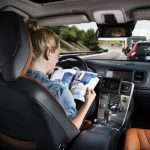 It may seem peculiar to bestow machines with a personality, much less regard the personality of the machine as important in terms of our engagement with it, but that’s precisely what new research from the University of Michigan suggests we expect from autonomous vehicles.
It may seem peculiar to bestow machines with a personality, much less regard the personality of the machine as important in terms of our engagement with it, but that’s precisely what new research from the University of Michigan suggests we expect from autonomous vehicles.
The researchers wanted to establish whether we regard it as important that the driverless vehicle we ride in has similar ‘personality’ traits to ourselves, and how this influences our perception of the safety of the vehicle.
“It’s all about perception,” the researchers say. “Objectively, autonomous vehicles could have very reliable performance, but if the human does not perceive them as safe, then they will not use them.”
Vehicle personality
The researchers examined personality through the lens of the big five personality traits: extroversion, agreeableness, conscientiousness, emotional stability and openness to experience. They wanted to explore how we feel about robots that have personalities, and especially when those match our own.
Around 440 drivers were surveyed firstly to explore how they personally scored on each of the big five. The volunteers then watched a range of videos where they were positioned in the front seat of an autonomous vehicle. The vehicle exhibited a range of driving behaviors, from normal to aggressive, with the vehicle operating in a range of driving conditions. The volunteers were asked to report how safe they felt in each scenario.
A number of interesting trends emerged in the data. For instance, riders often felt safest when both they and the vehicle exhibited traits of agreeableness, conscientiousness, and emotional stability. Similarly, if the rider scored lower in these three traits, they also preferred a vehicle with lower scores in these areas.
The findings open up the prospect of cars having distinct personalities to match that of their rider, with a particular focus on agreeableness, conscientiousness, and emotional stability related characteristics.
“The takeaway is that we want to design the autonomous vehicle to be agreeable, conscientious, and emotionally stable to increase perceived safety,” the researchers say. “Imagine the moment you get into an autonomous ride sharing vehicle, it pings your cell phone to update its driving style, voice, and the way it interacts with you.”